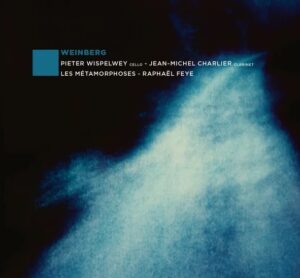
Onlangs verscheen een nieuw album met cello-werken van de Poolse componist Mieczyslaw Weinberg (1919-1996), uitgevoerd door Les Métamorphoses, cellist Pieter Wispelwey en klarinettist Jean-Michel Charlier.
English version below
Jarenlang is de muziek van de Joodse componist Mieczyslaw Weinberg nauwelijks in het westen uitgevoerd of uitgebracht op LP/CD. Gelukkig is daar de laatste decennia verandering in gekomen. Zo speelde het strijkkwartet Quatuor Danel al zijn strijkkwartetten (17) tijdens een 3-avond durende cyclus in 2019 in het Muziekgebouw aan ’t IJ in Amsterdam en voerde de Wiener Philhamoniker de bloedstollende opera The Passenger uit in 2010 met o.a. Michelle Breed en Roberto Sacca.
Componist Mieczyslaw Weinberg groeit op in een artistiek gezin. Zijn vader was violist en regisseur en zijn moeder actrice en zangeres. Hij studeerde in Warschau en kreeg een beurs voor een muziekstudie in Amerika. Door het uitbreken van de IIde Wereldoorlog ging zijn Amerika-studie niet door. Zijn familie, zijn vader, moeder en zus, werden vermoord door de Duitsers en Weinberg vluchtte via Minsk naar Oezbekistan en uiteindelijk naar Moskou, waar hij op uitnodiging van Sjostakovitsj naar toe verhuisde.
De werken van Weinberg worden door het orkest Les Métamorphoses adembenemend mooi, oprecht en eerlijk uitgevoerd. Wispelwey laat zijn cello klinken in een natuurlijke en vanzelfsprekende schoonheid. Klein, verfijnd maar ook breed en groots, met steeds een evidente loyaliteit aan de compositie. Iets soortgelijks vinden we ook terug in het klarinetspel, dat met een bevlogen souplesse en met gemak de signatuur van de muziek raakt.
De werken van Weinberg zijn veelomvattend, aangrijpend, zitten vol schurende chromatiek en dissonante harmonieën, fraaie thematiek en melodische passages waardoor de muziek, naast diepgang, ook een hoge mate van spanning in zich draagt. Wie daarnaast een beetje vertrouwd is met Weinberg’s achtergrond, kan niet ontkennen dat een grote genegenheid zich moeiteloos nestelt in de waardering voor deze oeverloos-bijzondere muziek!
- klik hier voor 3 recensies Weinberg
- klik hier voor recensie Weinberg door violist Linus Roth
- klik hier voor Complete viool-sonates door Linus Roth
English version
Recently a new album was released with cello works by the Polish composer Mieczyslaw Weinberg (1919-1996), performed by Les Métamorphoses, cellist Pieter Wispelwey and clarinetist Jean-Michel Charlier.
For years, the music of the Jewish composer Mieczyslaw Weinberg has hardly been performed or released on LP/CD in the West. Fortunately, that has changed in recent decades. The string quartet Quatuor Danel played all its string quartets (17) during a 3-evening cycle in the Muziekgebouw aan ’t IJ in Amsterdam in 2019 and in 2010 the Vienna Philhamoniker performed the fascinating opera The Passenger with Michelle Breed and Roberto Sacca, among others.
Composer Weinberg grew up in an artistic family. His father was a violinist and director and his mother an actress and singer. He studied in Warsaw and received a scholarship to study music in America. His American studies were canceled due to the outbreak of World War II. His family, his father, mother and sister were murdered by the Germans and Weinberg eventually ended up in Moscow via Minsk and Uzbekistan, where he moved to at the invitation of Shostakovich.
Weinberg composed 19 symphonies, clarinet, flute and trumpet concertos, an opera, violin concerto, chamber concert, 17 string quarts and beautiful cello works. Cellist Pieter Wispelwey recorded them on the album Weinberg with the orchestra Les Métamorphoses conducted by Raphaël Feye. The CD opens with the Cello Concertino op.43BIS. The work was discovered in 2016 in the archives of the Russian music scholar Abramovich Yakubov and was not (yet) included in the Weinberg catalogue. A lyrical work with glorious themes. In the fourth movement the theme returns in orchestral variations, played around by the cello variations. In the other parts, arrangements of Jewish dances can be heard. The Fantasy for Cello and Orchestra is one large composition in which the five movements merge seamlessly. A work that Weinberg composed ‘in a safe way’ in the early 1950s, as Russian music censorship forced him to do so. A composition full of (Polish) folk melodies, including the 3-part mazurka. The final work Chamber Symphony No.4 op. 153 is a piece that Weinberg composed from his sickbed in 1992. The work seems to be a retrospective, in which the composer zooms in on his works and quotes freely from them, with solo passages for clarinet referring to Jewish klezmer music.
Weinberg’s works are breathtaking and in a beautiful way performed by the orchestra Les Métamorphoses, very sincere and honest. Wispelwey lets his cello sound in natural beauty. Small, refined, but also broad and grand, always with an evident loyalty to the composition. We also find something similar in the clarinet, which easily touches the signature of the music with an inspired flexibility.
Weinberg’s works are comprehensive, poignant, full of abrasive chromaticism and dissonant harmonies, beautiful themes and melodic passages, so that the music, in addition to depth, also carries a high degree of tension. Anyone who is also somewhat familiar with Weinberg’s background cannot deny that a great affection is effortlessly put in the appreciation for this endlessly special music!
- Click here for 3 reviews Weinberg
- Click here for review Weinberg by violinist Linus Roth
- Click here for Complete violin-sonates by Linus Roth
Pieter Wispelwey / Jean-Michel Charlier, Les Métamorphoses o.l.v. Raphaël Feye: Weinberg
(Evil Penguin / New Arts International)
© Mattie Poels.

Geen reacties